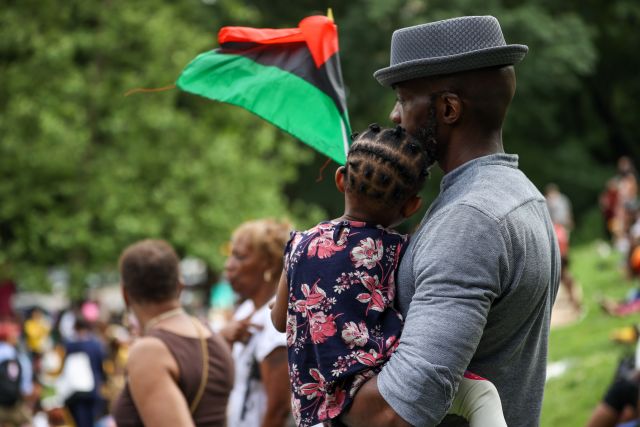Updated on May 14, 2024.
On June 19, many people across America and the world will observe the newest United States federal holiday, Juneteenth. (The name is a shorthand expression for “June Nineteenth.") Although federal recognition of Juneteenth is a recent development, this new national observance dates back more than 150 years.
Juneteenth commemorates the moment when the first enslaved African Americans in Galveston, Texas, effectively became free citizens on June 19, 1865. Although President Abraham Lincoln’s Emancipation Proclamation officially ended slavery two years before, the order was not enforced in many areas of the country until the end of the Civil War in 1865.
In June 2021—156 years after the first Juneteenth—President Joe Biden issued a “Proclamation on Juneteenth Day of Observance.” He called the new holiday a “celebration of freedom” and one that should be recognized by all Americans, regardless of background.
How is Juneteenth observed?
Americans can expect Juneteenth to be observed in a manner similar to other non-religious federal holidays, like Presidents’ Day, the Fourth of July, and Labor Day. This means that on the day Juneteenth is observed, banks, federal courts, and government agencies will close their doors and the U.S. stock market will pause trading. (The holiday is observed on June 19 or the nearest weekday if June 19 falls on a weekend.) Many offices and employers may also choose to observe the holiday in a variety of ways.
Educational and cultural events, celebrations, and festivals are held in communities throughout the country to commemorate the occasion and to encourage further progress toward racial equity, belonging, and inclusion. Thanks in part to the federal effort to recognize the holiday, Juneteenth offers an opportunity to reflect on a pivotal experience in American history.
Finding mental and emotional resolve during the holiday
In many respects, Juneteenth represents a theme of jubilance and optimism for progress made toward America’s ideals, as described in the Pledge of Allegiance: “One nation indivisible, with liberty and justice for all.” At the same time, the occasion evokes a violent and painful era for Black Americans and the descendants of enslaved people.
Rahn K. Bailey, MD, recognizes some psychological benefits in celebrating Juneteenth at an expanded scale as well as challenges in achieving those benefits. Dr. Bailey is a professor and head of the department of psychiatry at Louisiana State University Health Sciences Center in New Orleans.
The mere fact of federal observance of Juneteenth can foster mental and emotional healing and can help people cope with race-based stressors, Bailey says. When Americans allow Juneteenth to serve as a platform for discussion, recognition, and an exchange of ideas, the holiday can act as a positive force. In this way, Bailey argues, Juneteenth can serve as an important means of “psychological reparation” for Black Americans. This can bring validation to the humanity and experiences of enslaved people and their descendants.
One challenge, however, is that individuals may approach the holiday with different levels of openness.
"Some may choose not to acknowledge that mistreatments happened or they may quickly want to change the subject,” Bailey says. Whether such dismissive responses are intended or unintended, they can “undermine the legitimacy of a discussion about everything from race and racial animosity in our society to racism and overt aspects.”
It's important to know that your intention or expectation for observing Juneteenth may not be the same as that of a friend, loved one, or neighbor. It may also be helpful to remember that the holiday will not necessarily generate a celebratory response for all participants.
Festivities may give way to conflicting emotions
For many Americans, the expanded visibility of this “second Independence Day” can surface complex feelings and emotions toward the history of slavery and the widespread inequities stemming from the legacy of racism that persist to this day.
Camille Tenerife, LMFT, is a trauma therapist specializing in services for communities of color. She says that—despite the overt message of hope and progress that some derive from the holiday—observing Juneteenth may re-trigger one’s own past experiences of racial trauma and discrimination.
According to Tenerife, such episodes can occur any time of year. They may vary widely from person to person and may be accompanied by a range of physical symptoms. These include having trouble sleeping, a tightening feeling in the chest, and even having difficulty performing the routine functions of daily life.
In a special issue of the journal American Psychologist published in 2019, researchers defined racial trauma as a form of race-based stress experienced by people of color. This stress occurs in the context of experiences of racial discrimination, such as violence, incidents of humiliation and shaming, and even witnessing discrimination against others. More broadly, race-based stress refers to the psychological distress resulting from experiences with racism and discrimination.
“When we are feeling dysregulated in our internal systems, it will also then impact how we are in the day-to-day world,” Tenerife days. “So, it may be harder to regulate our emotions, harder to think clearly, harder to do everyday tasks during times we are re-triggered with the trauma.”
Balancing and reconciling difficult responses
According to Tenerife, the combination of positive and negative emotions can be a common response to observances like Juneteenth. She explains that it’s important to know that we don't have to feel only one type of emotion. “We can feel both the pains of racial trauma as well as gratitude for the things that we've done to get to where we are now,” she says.
When the fanfare or the historical events recalled during Juneteenth bring up difficulties, Tenerife suggests using the opportunity for a mental and physical check-in. This can not only help you explore the emotions you’re feeling, but also offer an opportunity to practice self-care.
For example, some people may experience feelings of loneliness or a sense of disconnection from those who appreciate the complexity and purpose of the holiday. In these cases, Tenerife suggests being mindful of the emotion while considering other ways to connect to one’s community. Simple opportunities may include spending time with family or engaging in an interest group locally.
“It is vital for the community to take extra care of themselves during this time or when thoughts of pain are re-triggered,” Tenerife says. “Listen to the emotion that’s coming up for you and tend to that feeling.”
There is no one way—or correct way—to observe the holiday
Tenerife and Bailey appreciate the communal benefits of observing the holiday on a national level. Tenerife adds that it’s a valuable time to not only grant one another the space and permission to celebrate, but also to invite oneself to do so in a way that is personal and meaningful.
“It could be learning more about the history, learning more about how it impacts your family lineage,” she says. “It could be a day of rest or a day of self-care, because then you’re also honoring what your ancestors and what you have been through. There are so many different ways to express that, and no single right way.”
If you’d like to observe the holiday with others, you can search online for group events happening in your community. If local opportunities are not available or accessible to you, you might opt for watching a movie or attending a smaller-scale cultural event, online or in person. If you prefer a more solitary, contemplative experience, you might choose to read, reflect, or meditate.
In cases where negative emotions seem to persist, Tenerife notes that reaching out to a healthcare provider or a mental health professional may help. Talk therapy can be a helpful way of coping. Sometimes a conversation with a trusted friend or loved one can be beneficial, as well.
“During the time of slavery, Black people were not allowed to honor their needs, and even to seek to do so could have deadly consequences,” Tenerife says. “We owe it to our ancestors and to ourselves to make sure we pay attention to anything that helps us heal today.”







